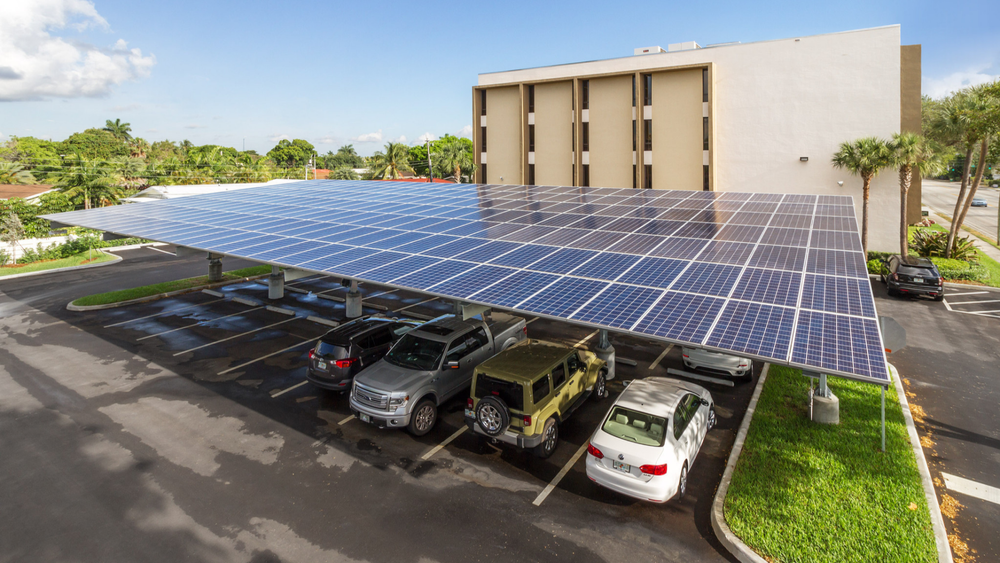Solar Carports in India: Smart Parking Solutions for Clean Energy Generation

Introduction
With the rise in fuel prices and the surge in vehicle ownership, India has seen a surge in EV sales. This will result in cities facing mounting parking and energy challenges. Solar carports offer an innovative, dual-purpose solution: combining shaded parking with clean energy generation. Solar carports can be adopted by anyone, be it commercial property owners, residential complexes, and shopping centers, optimizing space and contributing to sustainability in urban environments.
What Are Solar Carports?
A solar carport is a parking structure that combines the traditional function of providing covered parking for vehicles with the installation of solar panels on its roof that generate electricity. The structure is typically made from materials like steel or aluminum to support the weight of the photovoltaic (PV) panels and ensure durability. Unlike rooftop solar, solar carports can be classified as ground-mounted but elevated, ensuring ample clearance for vehicles.
Benefits of Solar Carports in India:
- Space Optimization: Utilizing existing parking space.
- Vehicle Protection: Shielding vehicles from weather impacts like harsh sunlight, monsoon rains or hail.
- Energy Generation: Generating clean energy and exporting with net metering policies in many states allows owners to sell surplus energy back to the grid, providing additional financial benefits.
- Environmental Impact: Each carport installation can lower carbon emissions, supporting national renewable energy targets—an attractive proposition for businesses aiming to meet sustainability goals.
Cost
The installation cost of a solar carport varies depending on materials, system size, and complexity.
- Average cost: ₹45,000–₹60,000 per kW for standard installations.
- Financing: Solar loans and leasing models can reduce upfront costs.
- Schemes: Check with a local installer if you can benefit from national or state subsidy schemes like PM Surya Ghar
Adapting Existing Structures & DIY Solar Carport Conversion
Converting Existing Carports and Sheds:
India’s evolving solar market makes it feasible to retrofit or upgrade existing carports, sheds, and covered parking structures into solar power generators. Most basic carports—built of steel or aluminum—can accommodate solar panels by reinforcing the roof, upgrading the mounting hardware, and ensuring electrical connectivity.
- Structural Assessment: First, ensure that your current carport frame is robust enough to handle the weight of solar panels and withstand wind loads, as per BIS standards. Minor upgrades like adding crossbeams or strengthening foundations often suffice for single-vehicle sheds and smaller metal-framed carports.
- Permitting: Retrofits and interconnection may need permits, depending on local building codes and grid interconnection requirements.
Modular Solar Carport Kits:
- Homeowners and small businesses can opt for “plug-and-play” solar carport kits, offered by many Indian solar vendors.
- These kits include pre-engineered mounting frames, inverters, safety gear, and wiring diagrams—often designed for efficient installation.
- Typical installation time for solar carport kits is 1–3 days, with a local solar installation partners.
- Many systems allow for modular expansion, so you can start with a single-vehicle carport and later add segments as energy needs grow.
Tips for Conversion & Increased Returns:
- Conduct a shade analysis to maximize power output from the installation. Shadow on the panels will reduce the energy generation.
- Opt for lightweight, corrosion-resistant materials when upgrading older carports. Use remote monitoring devices and automated cleaning systems for low-maintenance long-term performance.
- Connect to net metering for easy electricity billing and surplus energy sales.
Recent installations—including several commercial and hospital parking lots—demonstrate both the technical feasibility and strong financial payback for diverse Indian contexts.
Conclusion
Solar carports stand out as a future-ready solution for India’s energy and parking challenges. They offer space efficiency, energy savings, and vehicle protection—ideally suited to Indian cities and climate. Property owners seeking cost-effective, sustainable solutions should consult experts for custom site assessments.
